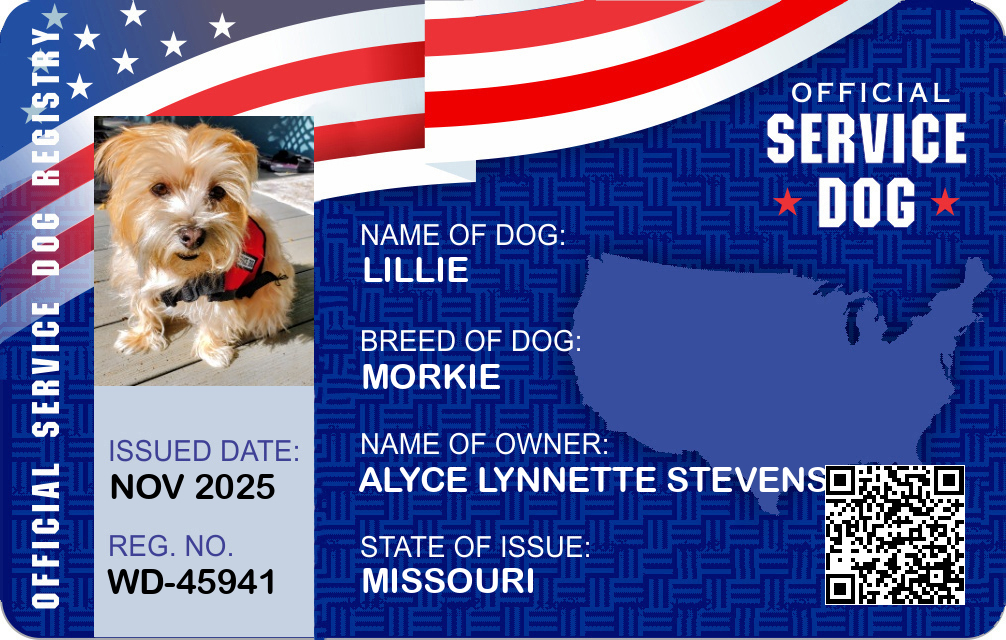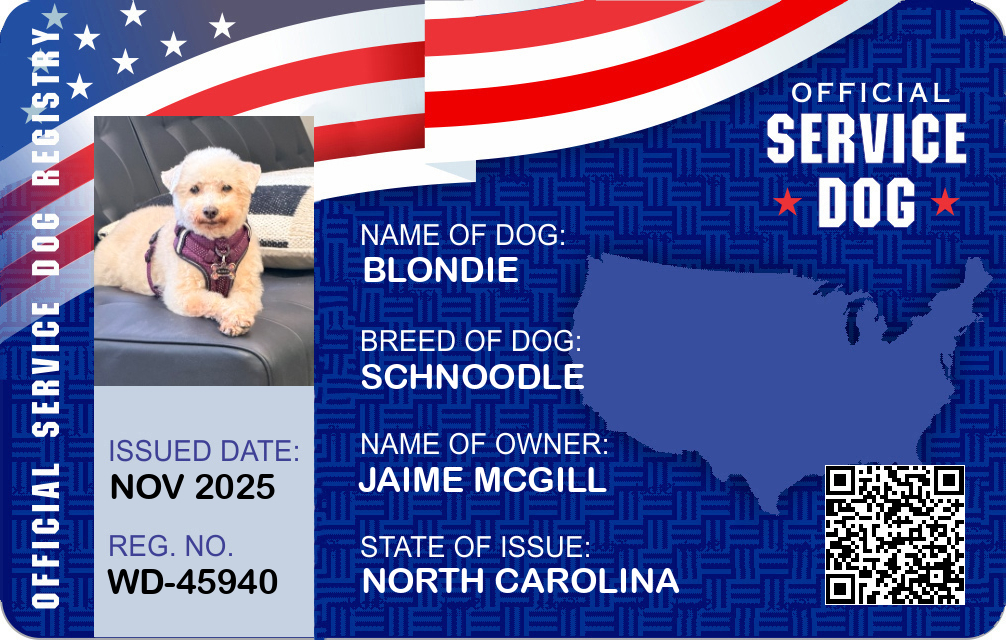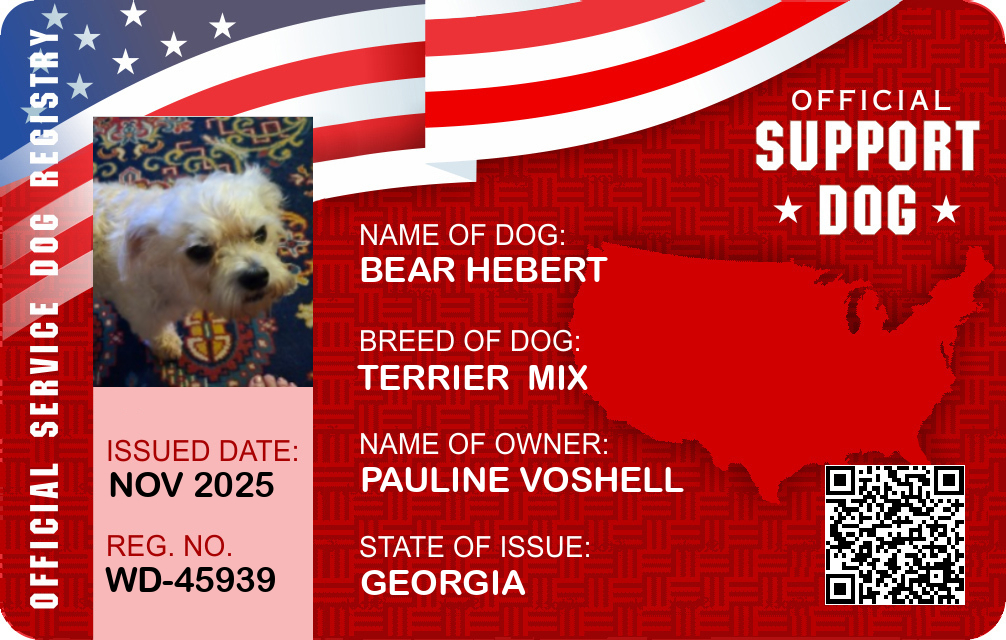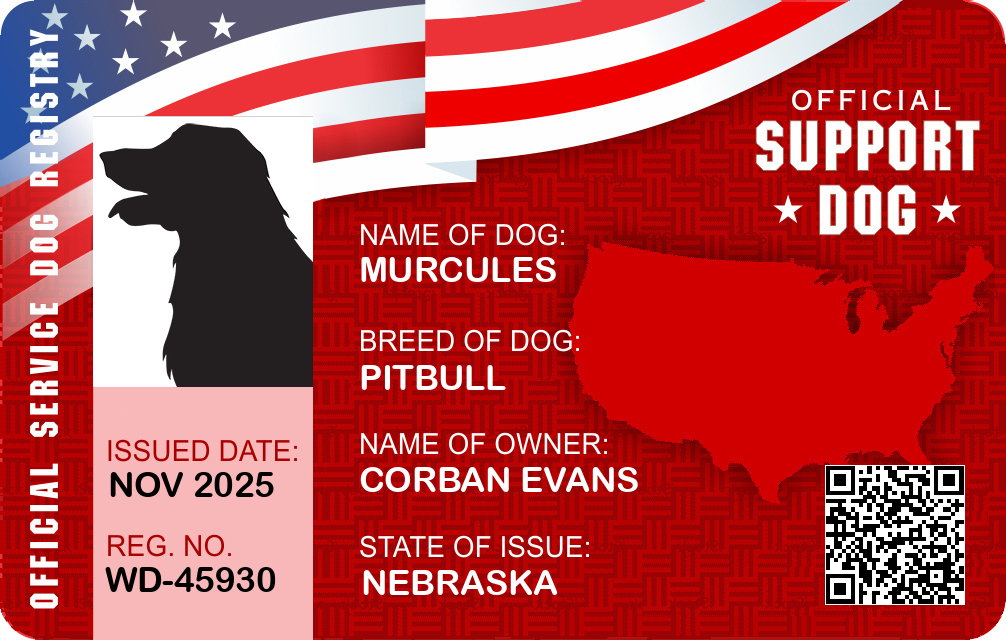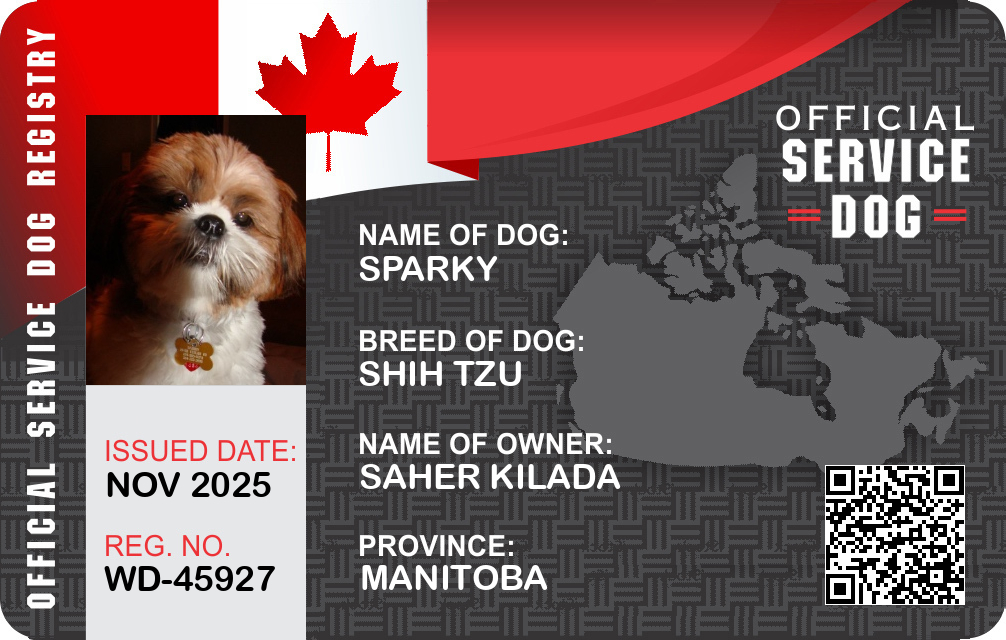Georgia Service Dog Laws
Register Your Dog

Overview of Service Dog and Legal Definitions in Georgia
What is a Service Dog?
Under both federal and state law, a service dog is individually trained to perform tasks or do work for a person with a disability. In Georgia, as in other states, the critical factor is the dog’s training and ability to mitigate one or more effects of the handler’s disability. These tasks might include guiding someone with visual impairments, alerting someone with hearing impairments, or performing tasks for individuals with mobility issues. The nature and type of assistance depend largely on the handler’s specific disability needs.
How Service Dogs Differ from Other Types of Assistance Animals
Service dogs are distinct from other assistance animals in terms of their training and the specific tasks they perform. While emotional support animals (ESAs), therapy animals, and companion animals might provide comfort and therapeutic benefits, they are not trained to perform specific tasks directly related to an individual’s disability. Consequently, service dogs have more extensive legal protections, particularly regarding access to public places and situations where other animals might not be allowed.
Key Federal Laws Affecting Service Dogs (e.g., ADA, FHA, ACAA)
Several federal laws offer protections and guidelines concerning the use of service dogs, including the Americans with Disabilities Act (ADA), the Fair Housing Act (FHA), and the Air Carrier Access Act (ACAA). The ADA mandates public access rights for service dogs, ensuring individuals with disabilities can bring their service dogs into most public places. The FHA provides housing rights for individuals with disabilities, ensuring they can keep service dogs in housing with pet restrictions, while the ACAA covers travel, specifically air travel, and requires airlines to allow service dogs to accompany their handlers in the cabin.
State-Specific Service Dog Laws in Georgia
Housing Rights and Responsibilities
The Fair Housing Act firmly extends federal protection, requiring landlords to accommodate service dogs, even in properties with ‘no pets’ policies. In Georgia, the same rules apply. Importantly, landlords cannot impose pet fees or deposits for service dogs. They may, however, request documentation that verifies the need for a service dog, although they cannot ask for detailed information regarding the handler’s disability. Verification might include a letter from a healthcare provider citing the necessity of the service animal due to the handler’s specific disability.
Public Access and Accommodation
Similar to the ADA, Georgia law also ensures that individuals with disabilities have the right to be accompanied by their service dogs in public spaces without being subjected to additional costs or constraints. Public places include restaurants, hotels, retail shops, theaters, and hospitals. Under the law, establishment owners and operators may only ask two specific questions if it’s not obvious what service the dog provides: (1) Is the dog required because of a disability? and (2) What work or task has the dog been trained to perform?
Transportation and Travel Rules
For transportation within Georgia, service dogs are permitted to accompany their handlers on public transportation systems, including buses and trains, without additional fees. Under the ACAA, airlines must permit qualified individuals with disabilities to fly with their service dogs in the cabin at no extra cost, although they might need to provide documentation under certain circumstances. However, it’s advised to check with specific carriers ahead of time for any particular procedures.
Employment and Workplace Considerations
In the workplace, both the ADA and state laws in Georgia require employers to accommodate service dogs as a reasonable adjustment for employees with disabilities. This ensures such employees can perform the essential functions of their job. Employers in Georgia cannot discriminate against employees using service dogs, and reasonable modifications must be provided unless doing so would result in undue hardship to the employer’s operations.
Documentation, Requirements, and Processes in Georgia
While federal law under the ADA does not necessitate documentation for service animals brought into public areas, certain situations—such as housing or air travel—may require documentation. In Georgia, appropriate documentation usually comes in the form of a letter from a licensed health practitioner. This documentation should confirm the handler’s disability and the necessity of a service dog, although detailed medical information is not required, nor should it be requested.
Landlord, Business, and Provider Verification Rules
In Georgia, landlords, business owners, and service providers can ask for certain documentation in specific circumstances, such as housing or airline travel. They are, however, limited to inquiries directly related to the service dog’s function and cannot demand private medical details. If the necessity of the service dog is apparent, no further documentation can be required.
Rights, Limitations, and Legal Risks
Rights Service Dog Handlers Have in Georgia
Handlers have the right to public and private accommodations alongside their service dogs, with no additional fees. They also have the right to housing and workplace accommodations, barring any fundamental alterations or undue hardships these would pose to property or business operations. Travel is another protected area, with allowances for service dogs on airlines and public transit systems.
Limits on Service Dog Protections and Common Restrictions
While service dogs are widely permitted and protected, there are limitations. Dogs that are not under control or that display aggressive behavior could be denied access. Additionally, the presence of a service dog in certain sterile environments, such as some operating rooms and sterile laboratories, might be restricted due to health and safety regulations.
Penalties for Fraud or Misrepresentation
Misrepresenting a pet as a service dog is illegal in Georgia. This misconduct not only undermines the utility and legitimacy of genuine service dogs but also carries legal penalties. Offenders might face fines or other legal consequences, emphasizing the importance of honesty and compliance with regulations.
Practical Guidance for Service Dog Handlers in Georgia
How to Qualify for a Service Dog Legitimately
Qualifying for a service dog requires having a documented disability and identifying specific tasks that a service dog can perform to mitigate that disability. Prospective handlers should consult with professionals or organizations specializing in service dog training to ensure the chosen dog is appropriately trained for the said tasks.
How to Talk to Landlords, Airlines, and Employers
Service dog handlers should be ready to provide necessary documentation, where applicable, while maintaining privacy regarding specific health conditions. Keeping communication concise and focused on the service dog’s tasks and the legal basis for its role can often smooth interactions with landlords, airlines, and employers.
Summary of Service Dog Laws in Georgia
Navigating service dog laws in Georgia requires an understanding of both federal and state-level protections and requirements. **
- **Service dogs are defined as dogs trained to perform tasks for individuals with disabilities.
- **The ADA, FHA, and ACAA provide a framework for public access, housing rights, and travel accommodations.
- **Georgia state laws reinforce these federal protections within the state, ensuring public access and nondiscrimination.
- **Documentation requirements are typically limited to situations like housing and air travel.
- **Handlers should be aware of limitations regarding aggressive behavior or uncontrolled dogs.
- **Misrepresentation of a pet as a service dog is illegal and subject to penalties.
- Effective communication and proper documentation help ensure smooth interactions in various scenarios, from housing to air travel.
By understanding and complying with service dog laws in Georgia, handlers can effectively exercise their rights while maintaining harmony with the wider community.



